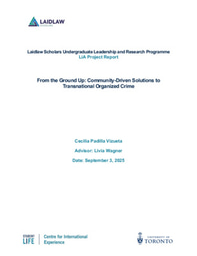Overview of Week 3
Week 3 marked the start of my collaboration with the Eurasia Observatory. I supported three streams: (1) analyzing the political economy of organized crime in Belarus through open‑source data on drug seizures; (2) examining the use of digital currencies by criminal actors in Central Asia, including the Kyrgyzstan‑issued, ruble‑backed token A7A5; and (3) gathering intelligence on Uzbek criminal groups re‑establishing networks in Russia and Europe. I also continued updating the cybercrime convention matrix.
What went well?
Working with new colleagues on the Observatory forced me to develop various skills quickly. I produced a short memo summarizing recent drug seizures in Belarus and their implications for state‑embedded actors. In the digital‑currency review, I noted that the A7A5 stablecoin launched in January 2025 had surged to more than $40 billion in transaction volume by July, enabling Russian businesses to bypass Western sanctions. This finding alerted the team to the emerging nexus between crypto‑assets and organized crime. For the Uzbek groups, I was briefed on the historical criminal alliances of the region by regional experts on GI-TOC's Asia Pacific observatory.
What could have gone differently?
Language barriers were a recurring challenge for me this week. Much of the information on Belarus and Uzbekistan was available only in Russian or local languages, and I had to rely on translation apps and colleagues’ guidance (time permitting). This sometimes slowed my analysis. In future times, I will allocate additional time for language‑specific research.
What did I learn about myself when working with others?
This week had me going out of my work comfort zone thematic and regional wise. This in turn helped me realize how stimulating it is for me to work outside my comfort zone. Digital currencies and Central Asian organized crime were new topics to me, yet my curiosity motivated me to ask questions and absorb information. I also noticed that I tend to be cautious when presenting findings; but despite this, this week I challenged myself to share preliminary insights even when not fully confident.
What did I learn about leadership?
I learned that leadership can mean empowering others by providing timely information. My memo on A7A5 showed how cross‑disciplinary analysis (combining finance and security issues) can influence organizational priorities. The collaboration with Belarusian and Uzbek experts was essential for advancing this week, which taught me to value teamwork. This week helped me realize the importance of developing “people” capacities such as cross‑cultural communication and process skills like strategic analysis.
What do I want to develop or focus on next?
In Week 4 I will accompany colleagues to the United Nations headquarters for in‑person negotiations. I hope to observe multilateral dynamics first‑hand and apply my research to advocacy.

Please sign in
If you are a registered user on Laidlaw Scholars Network, please sign in